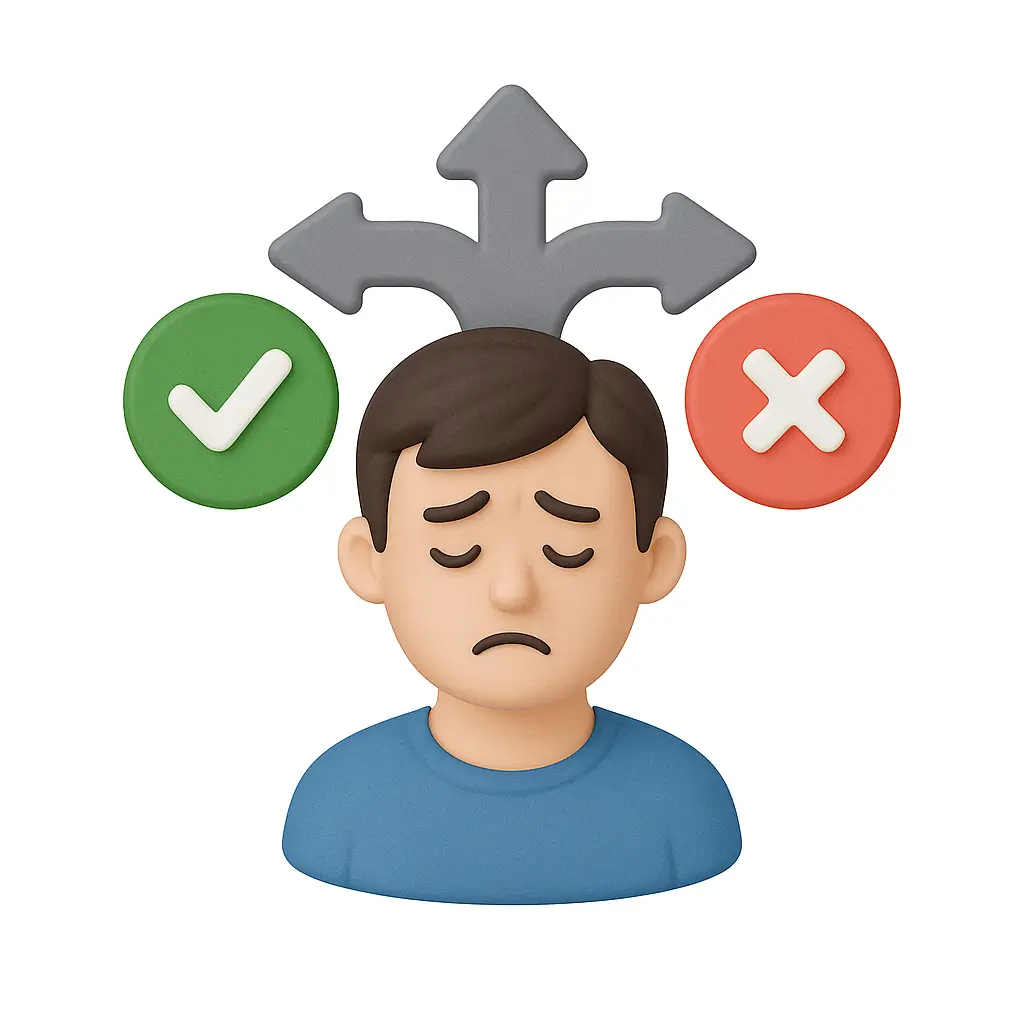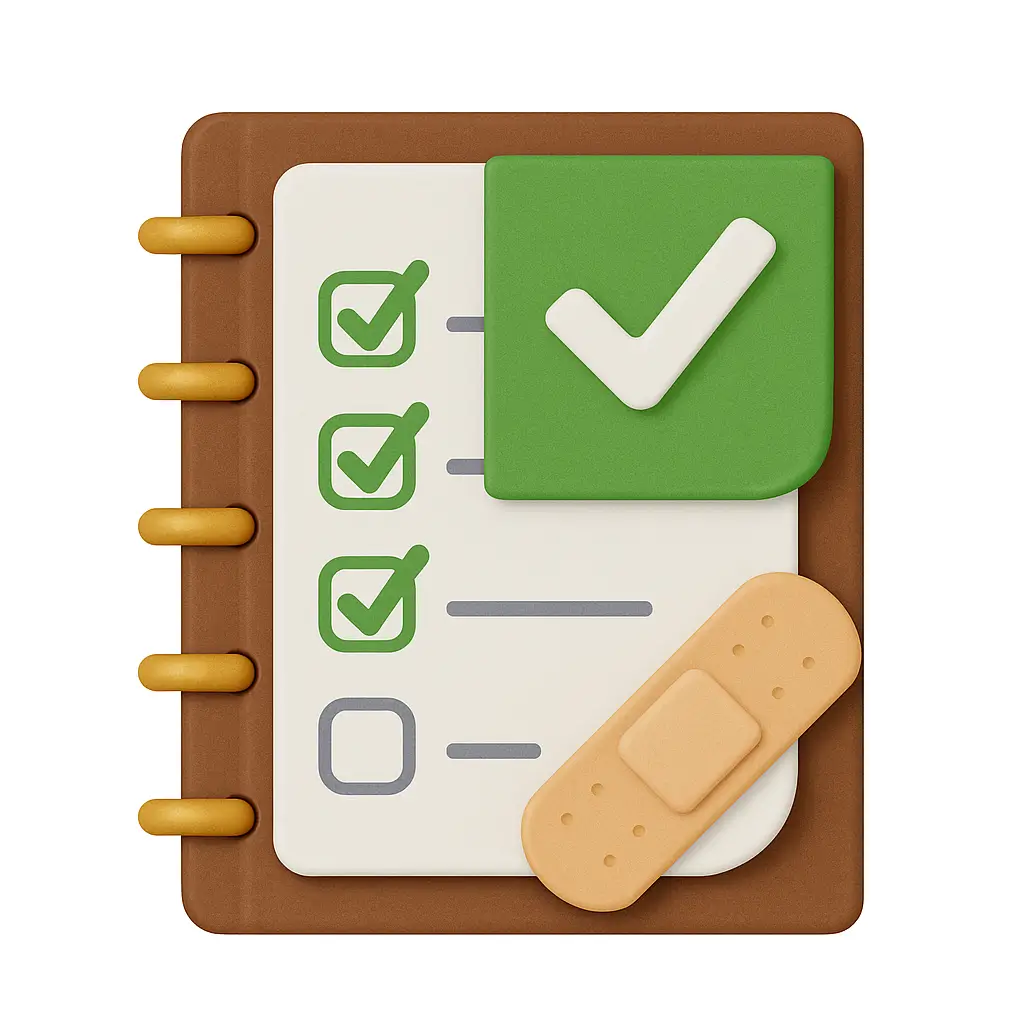Decision Fatigue 101
Make better choices when your brain is tired
June 19, 2025 · 7 min read

😵💫 The 3pm crash that’s not about coffee
Sarah stares at her laptop screen. It’s 3:17 PM, and she can’t decide whether to respond to emails or finish her presentation.
Five minutes pass. She’s still staring.
This isn’t laziness. It’s decision fatigue.
Your brain makes roughly 35,000 decisions per day. From what to wear to which route to take to work, each choice chips away at your mental energy.
By afternoon? You’re running on fumes.
What decision fatigue is
Decision fatigue happens when your brain’s decision-making capacity gets depleted. Think of it like a phone battery that slowly drains throughout the day.
The science is clear:
- Your prefrontal cortex (the decision-making center) uses glucose for fuel
- Each decision burns through this mental energy
- When depleted, you either avoid decisions or make poor ones
This explains why you can nail a morning presentation but struggle to pick dinner by evening.
The hidden cost of tiny choices
Most people focus on big decisions. But it’s the small ones that drain you:
Morning micro-decisions:
- Which coffee mug to use
- What playlist to listen to
- Which route to take
- What to eat for lunch
Work micro-decisions:
- Which email to answer first
- How to phrase a response
- Whether to attend that optional meeting
- Which task to tackle next
These seem insignificant. But they add up fast.
Why tired brains choose worse
Research shows fatigued brains take shortcuts:
Option 1: Avoid deciding altogether (procrastination)
Option 2: Go with the easiest choice (often the wrong one)
Option 3: Stick with the status quo (even when change is needed)
Ever wonder why you order the same thing at restaurants when you’re tired? That’s decision fatigue in action.
Save your mental energy
Batch Similar Decisions
Instead of deciding what to wear each morning, plan outfits for the week on Sunday. Steve Jobs wore the same black turtleneck daily for this exact reason.
Try batching:
- Meal planning on weekends
- Setting up email templates
- Creating morning and evening routines
- Scheduling similar tasks together
Use the Two-Minute Rule
If a decision takes less than two minutes to make and execute, do it immediately. This prevents small choices from piling up and overwhelming you later.
Create Decision Frameworks
For recurring choices, build simple rules:
- “I always take the stairs if it’s three floors or less”
- “I check email at 9 AM, 1 PM, and 4 PM only”
- “I say no to meetings without clear agendas”
These frameworks eliminate the need to decide each time.
Tackle Important Decisions Early
Your decision-making power is strongest in the morning. Schedule important choices before 11 AM when possible.
Save routine tasks for later in the day when your mental energy is lower.
The power of ‘good enough’
Perfectionism amplifies decision fatigue. Not every choice needs extensive analysis.
Ask yourself:
- Will this matter in five years?
- Is the difference between options significant?
- Am I overthinking this?
Sometimes the best decision is the quick one.
Build your decision diet
Just like you wouldn’t eat junk food all day, don’t feed your brain junk decisions.
High-value decisions deserve your best mental energy:
- Career moves
- Relationship choices
- Financial investments
- Health decisions
Low-value decisions should be automated or eliminated:
- What to wear
- What to eat for breakfast
- Which pen to use
- Whether to check social media
Your action plan
This week, try this:
- Track your decisions for one day. Notice when you feel most drained.
- Identify three recurring choices you can automate or batch.
- Move one important decision to your morning routine.
- Create a simple framework for one type of recurring decision.
Bottom line
Decision fatigue isn’t a character flaw. It’s a biological reality.
The goal isn’t to eliminate all decisions. It’s to spend your mental energy wisely.
Save your best thinking for choices that truly matter. Everything else? Make it automatic.
Your 3 PM self will thank you.
---
What’s one decision you could automate this week? Start small and build from there.

